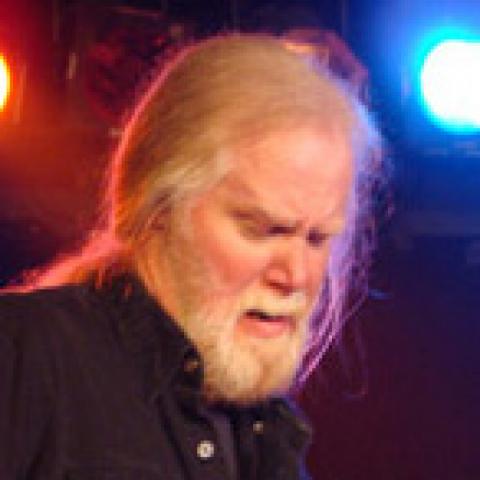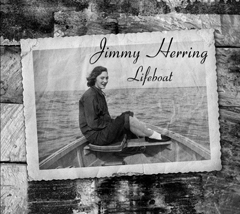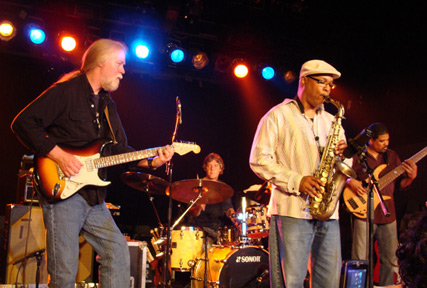 It was a perfect night for some music in Raleigh so I
headed to the Lincoln Theater. I have
still never heard Jimmy Herring speak a word on stage. Not a "Thanks,
goodnight." Not a "One, two, three, four." Not even a "On drums
tonight..." Not even when it's with his own band. He lets a pair of
Fender Stratocasters do all the talking. And those boys have things
they want to tell you.
It was a perfect night for some music in Raleigh so I
headed to the Lincoln Theater. I have
still never heard Jimmy Herring speak a word on stage. Not a "Thanks,
goodnight." Not a "One, two, three, four." Not even a "On drums
tonight..." Not even when it's with his own band. He lets a pair of
Fender Stratocasters do all the talking. And those boys have things
they want to tell you.
Since it was a perfect night, why not a perfect sized crowd for the Lincoln? The old theater was full but not crowded. I'm sure the promoter would have preferred a few more but this was a comfortable number. It was a very appreciative crowd, if not a bit subdued. That probably resulted from a combination of it being Sunday night, inherent jazz sophistication, and having our brains put on pause by the stunning display of dexterity before us. Looking around at the crowd I noticed a nice range of age tending toward the more... experienced. It's also hard not to notice that apparently, by and large, this is white guy music. That's cool, some of my favorite music is white guy music.
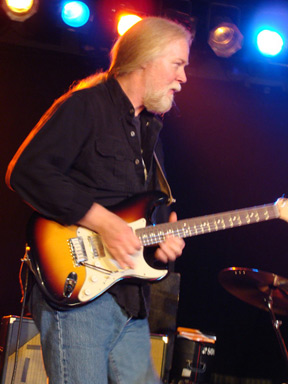 Jimmy Herring's career has been mostly defined as someone else's
guitarist. He is a current member of Widespread Panic, a founding
member of Aquarium Rescue Unit, and has played with Allman Brothers,
Phil Lesh, The Dead, Project Z and others. Possibly most telling is his
association with jazz fusion veterans Billy Cobham, Alphonso Johnson
and T. Lavitz in Jazz Is Dead. He is now stepping out for the first
time with his own band and is out touring in support of his 2008
Abstract Logix released solo debut "Lifeboat." From the very beginning,
improvisation has been at the core of his many projects and The Jimmy
Herring Band is no exception.
Jimmy Herring's career has been mostly defined as someone else's
guitarist. He is a current member of Widespread Panic, a founding
member of Aquarium Rescue Unit, and has played with Allman Brothers,
Phil Lesh, The Dead, Project Z and others. Possibly most telling is his
association with jazz fusion veterans Billy Cobham, Alphonso Johnson
and T. Lavitz in Jazz Is Dead. He is now stepping out for the first
time with his own band and is out touring in support of his 2008
Abstract Logix released solo debut "Lifeboat." From the very beginning,
improvisation has been at the core of his many projects and The Jimmy
Herring Band is no exception.
The band took the stage promptly at 8:30 and set right in. They opened with the hauntingly melancholy Stevie Wonder penned "Cause We've Ended As Lovers" off of Jeff Beck's 1975 "Blow by Blow" album. It set the tone and the feel for the evening. The comfortable pace served as a friendly handshake with the audience introducing the players and instruments. It was kind of like introducing the instruments at a young people's symphony concert. "This is the bass. The bass sounds like this..." There was even a touch of Oteil's scat vocals. It was just a warm up.
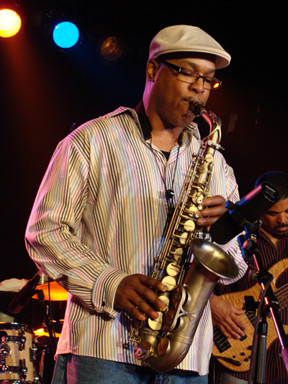 On stage, Herring is joined by long time collaborators Jeff Sipe
(Aquarium Rescue Unit, Jazz is Dead) on drums and multi talented, multi
instrumentalist Oteil Burbridge (Allman Brothers, Aquarium Rescue Unit,
Oteil & the Peacemakers) playing bass. The lineup for the evening
was rounded out by the outspoken Greg Osby who was named Playboy
Magazine's "Jazz Artist of the Year" on alto sax and clarinet and
keyboardist Scott Kinsey (Tribal Tech). Oteil is only playing the
spring leg of the tour. During the summer portion of the tour the bass
duties will be handled by Matthew Garrison (John McLaughlin, Herbie
Hancock, Pat Metheny). According to Herring's website "It's a shot of
adrenaline to get to play with musicians who are pushing the envelope
and breaking down the walls that exist between genres of music. Each of
these musicians inspires with every note they play."
On stage, Herring is joined by long time collaborators Jeff Sipe
(Aquarium Rescue Unit, Jazz is Dead) on drums and multi talented, multi
instrumentalist Oteil Burbridge (Allman Brothers, Aquarium Rescue Unit,
Oteil & the Peacemakers) playing bass. The lineup for the evening
was rounded out by the outspoken Greg Osby who was named Playboy
Magazine's "Jazz Artist of the Year" on alto sax and clarinet and
keyboardist Scott Kinsey (Tribal Tech). Oteil is only playing the
spring leg of the tour. During the summer portion of the tour the bass
duties will be handled by Matthew Garrison (John McLaughlin, Herbie
Hancock, Pat Metheny). According to Herring's website "It's a shot of
adrenaline to get to play with musicians who are pushing the envelope
and breaking down the walls that exist between genres of music. Each of
these musicians inspires with every note they play."
The next song was a reading of Wayne Shorter's pre Weather Report classic "Speak No Evil". It is a deceptively simple melody that offers a variety of different avenues to explore before returning to the melody. It naturally enough features Greg Osby's clarinet. Osby spent roughly equal time playing the clarinet and alto sax during the evening. I really appreciated Greg's economy. He would take passages off and let the other instruments expand a bit and breathe before rejoining the mix. It may take repeated listening to the excellent audience recording to really appreciate everything he was doing. His solos throughout the show were challenging but restrained.
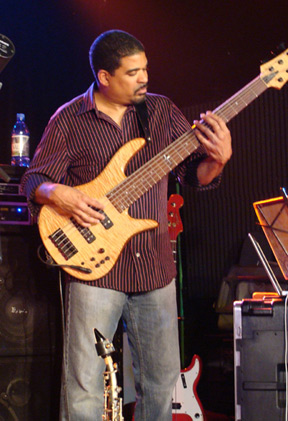 After "Speak No Evil" they began playing tracks from the "Lifeboat"
album with the first being "Only When It's Light", an Oteil
contribution. I believe it was at this point that Oteil switched from
his Fender Jazz 4 string to his 6 string bass. "This is the 6-string
bass. The 6-string bass sounds like this..." It was fun to see Oteil in
this setting. It may have been the some of the freest unencumbered
playing I have ever seen from him. He is constrained in the Allman
Brothers because of the song structures and expectations. When he is
heading Oteil & the Peacemakers the burden of carrying the show is
all on him. With this arrangement he is free to play as he pleases.
After "Speak No Evil" they began playing tracks from the "Lifeboat"
album with the first being "Only When It's Light", an Oteil
contribution. I believe it was at this point that Oteil switched from
his Fender Jazz 4 string to his 6 string bass. "This is the 6-string
bass. The 6-string bass sounds like this..." It was fun to see Oteil in
this setting. It may have been the some of the freest unencumbered
playing I have ever seen from him. He is constrained in the Allman
Brothers because of the song structures and expectations. When he is
heading Oteil & the Peacemakers the burden of carrying the show is
all on him. With this arrangement he is free to play as he pleases.
Jimmy's first self-penned song of the evening "New Moon" begins with arching atmospherics that painted sheets of sound. During the entire performance if he wasn't filling a lead role he was supplying atmosphere, texture and color. The keys filled the rhythm role. At points it was like listening to the Northern Lights. (Southern Lights are probably more fitting.) Scott Kinsey makes his presence first felt with some highly altered vocals. They are almost Peter Frampton sing thru your guitar altered. Almost, but thankfully only almost. Then Jimmy stakes claim to his song. Expressive soloing pulling the emotions out of the guitar in a way his main gig with WSP doesn't allow. This was followed by another Herring song "Transients".
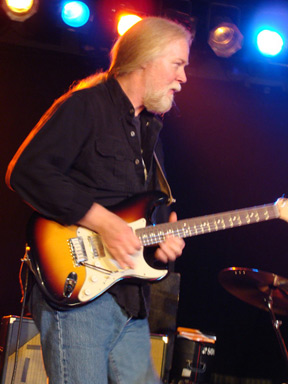 Another cut from the album and maybe the most intriguing song of the
night was the Jungle Book Theme. Yep, that Jungle Book. It was
beautifully rendered. It WAS the living breathing jungle book. King
Louie is cooled out somewhere snapping his monkey fingers saying
something very jazzy. He's probably wearing a beret and smoking a
French cigarette too so that's about as far as we want to go with that.
Another cut from the album and maybe the most intriguing song of the
night was the Jungle Book Theme. Yep, that Jungle Book. It was
beautifully rendered. It WAS the living breathing jungle book. King
Louie is cooled out somewhere snapping his monkey fingers saying
something very jazzy. He's probably wearing a beret and smoking a
French cigarette too so that's about as far as we want to go with that.
An Aquarium Rescue Unit standard, "Splash", written by Oteil followed. This is when things got crazy sounding. Notes were flying at me at a dizzying pace. The only complaint, if there were one, would be that perhaps there are too many voices on stage. All of them exceptional voices, but sometimes I would find myself wishing for a leaner sound. There were passages in which the music was so dense that I knew I was missing half of it. I just couldn't process fast enough to keep up with everything. The timing changes alone required concentration to follow.
Jeff Sipe's drumming, when you can pull your ears away from Jimmy, is phenomenally good. He is completely unobtrusive. He fills the entire space without being busy or overcomplicated. His drumming spreads out like a canvas that the soloists can display their wares on.
"Grey Day" is another Jimmy song and the last of the "Lifeboat" cuts until the encore. This music is intricate even in the quietest passages. I was glad it was at the Lincoln with no assigned seating. Heck, there aren't any seats to assign so that works out ok. But if I could have plopped a Lazyboy lounger right there in the middle of the floor, turned the lights off, lit some candles and burnt some incense I could have gone on an epic inner journey.
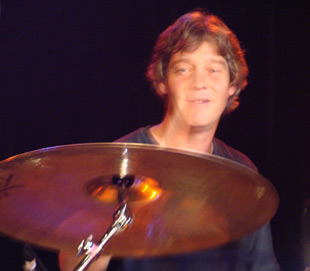 They played the second Jeff Beck track of the night with "Sophie"
the Narda Michael Walden song off of 1976's fusion masterpiece "Wired."
I will listen to Jimmy's work with WSP in a slightly different way from
now on. I never really thought about a Jeff Beck influence there. It
may not be present but I'll probably bug the heck out of people trying
to hear it and more annoyingly trying to get them to hear it too. Oh
well, sorry in advance. This tune really slowly builds into a fine
frenzy.
They played the second Jeff Beck track of the night with "Sophie"
the Narda Michael Walden song off of 1976's fusion masterpiece "Wired."
I will listen to Jimmy's work with WSP in a slightly different way from
now on. I never really thought about a Jeff Beck influence there. It
may not be present but I'll probably bug the heck out of people trying
to hear it and more annoyingly trying to get them to hear it too. Oh
well, sorry in advance. This tune really slowly builds into a fine
frenzy.
I thought the next song had a very strong Frank Zappa influence to it. No, not a FZ influence, it was Zappa's "Zoot Allures" from his 1976 album of the same name. Fitting as "Zoot" is one of Frank's best guitar solo showcases. It featured some of the best soloing from Jimmy and Greg of the entire show along with one of the more pronounced solos from Oteil and more scat vocals. I don't know if Senor Sipe followed the FZ/Terry Bozio drum score for this but it was a reasonable facsimile.
The set closer was "Dawn." As it turns out, approximately one quarter of all songs ever written are titled "Dawn." I am going to hazard a guess and say this is the Ornette Coleman version. It was a sprawling 16 minute colossus that slips in and out of the main theme repeatedly.
At the close of the set Oteil says "Thanks!" and then amusedly does the band intros. There must be some gruesome microphone trauma in Jimmy's past. Giant evil microphone in the closet as a little kid kind of trauma. I know people that have spoken to him in person and say that, while he is a man of very few words, he does have an actual voice. And it isn't a chicken voice or anything. It's no big deal but I really thought I had a shot at hearing him speak. Again, oh well.
After a very short break they came back out for the encore. They played Scapegoat Blues, another Herring tune from "Lifeboat". While most of the other songs in the set had a... not somber, but serious note to them, this was more joyful playing. I could see this possibly finding its way into a Panic set. Or not.
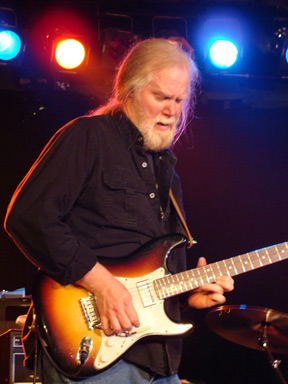 If you go to a JHB performance expecting to hear a non-stop Jimmy
Herring RAWKING shredfest you might have to re-adjust your expectations.
The shrediness is there but he does it within the arena of jazz fusion.
His guitar playing, in this context, is as much about the emotion of
single notes as it is the jaw dropping dexterity that produces notes in
dense swarms. But don't worry, those swarms are inside those Strats
just waiting to come converse with you. The way he fires off flurries
of notes in measured bursts under such control reminded me a lot of
John McLaughlin. He has absolute mastery of his instrument. Oteil is
always a joy to watch play. The sound at the show was a bit crisper
than the aud plus the visual cues of watching him give you an idea of
where the music is going. Greg Osby may be a jazz genius. I don't know.
I don't think I'm qualified to make a call like that. I do know that he
can make a clarinet and a sax go to some crazy places and then bring
them back at will. Jeff Sipe's drumming was just exactly perfect for
every part of the show. You can see flashier drummers but you'd be hard
pressed to find a more fulfilling one. Scott Kinsey's keys only really
came to the forefront on a few occasions. He seemed to be entirely
competent but spent most of his time in the background lending a much
needed sense of cohesion. And that brings up the other issue I had.
There wasn't enough direct interplay between the principal soloists,
Jimmy and Greg. They both played brilliantly but they took turns
playing brilliantly. Maybe that's just the nature of their brand of
jazz or maybe I just missed it. I would have preferred more of a call
and response trading of musical ideas. More of a musical conversation.
At their best points they achieved this and suddenly everything would
jell and they'd be hitting the sound just right for me. But even at
their most estranged it was still tight, emotive, free ranging and
absolutely drop dead virtuosity. Wait, did he just say something...?
If you go to a JHB performance expecting to hear a non-stop Jimmy
Herring RAWKING shredfest you might have to re-adjust your expectations.
The shrediness is there but he does it within the arena of jazz fusion.
His guitar playing, in this context, is as much about the emotion of
single notes as it is the jaw dropping dexterity that produces notes in
dense swarms. But don't worry, those swarms are inside those Strats
just waiting to come converse with you. The way he fires off flurries
of notes in measured bursts under such control reminded me a lot of
John McLaughlin. He has absolute mastery of his instrument. Oteil is
always a joy to watch play. The sound at the show was a bit crisper
than the aud plus the visual cues of watching him give you an idea of
where the music is going. Greg Osby may be a jazz genius. I don't know.
I don't think I'm qualified to make a call like that. I do know that he
can make a clarinet and a sax go to some crazy places and then bring
them back at will. Jeff Sipe's drumming was just exactly perfect for
every part of the show. You can see flashier drummers but you'd be hard
pressed to find a more fulfilling one. Scott Kinsey's keys only really
came to the forefront on a few occasions. He seemed to be entirely
competent but spent most of his time in the background lending a much
needed sense of cohesion. And that brings up the other issue I had.
There wasn't enough direct interplay between the principal soloists,
Jimmy and Greg. They both played brilliantly but they took turns
playing brilliantly. Maybe that's just the nature of their brand of
jazz or maybe I just missed it. I would have preferred more of a call
and response trading of musical ideas. More of a musical conversation.
At their best points they achieved this and suddenly everything would
jell and they'd be hitting the sound just right for me. But even at
their most estranged it was still tight, emotive, free ranging and
absolutely drop dead virtuosity. Wait, did he just say something...?
- Review by Jeff McClellan
- Photos by Lee Crumpton


